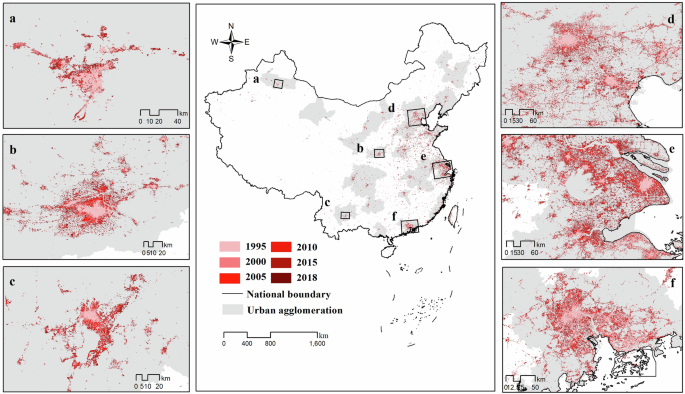

China's urbanization over the past two decades has led to both increased polarization and a decline in polarization within urban agglomerations, according to a study published in Nature.com [d76d797d]. The research analyzed the spatial and temporal characteristics of built-up area expansion across 23 urban agglomerations in China, revealing patterns of urbanization and their impact on city size distribution.
The study found that coastal urban agglomerations in China were larger in size and experienced higher annual growth rates compared to inland agglomerations, indicating rising polarization. However, within these agglomerations, there was a decline in polarization, as evidenced by the reduction in the urban primacy index and the increase of the Pareto exponent. These findings suggest that policies implemented to enhance urbanization coordination in China have been partially successful, but the growth of urban regions with existing large size continues to fuel uneven urban development and polarization [d76d797d].
This research provides valuable insights into the challenges and complexities of urbanization in China. It highlights the need for continued efforts to address the uneven development and polarization resulting from rapid urban expansion. By understanding the patterns and dynamics of urbanization, policymakers can make informed decisions to promote balanced and sustainable development across different regions in China.
Africa's urban transition is quicker than China's but largely decoupled from industrialization, according to an article in Asia Times [fcc76271]. The author argues that China's economic reforms were bold, broad, and uneven, and no country has reached middle-income status without undergoing a well-managed process of urban transition. However, Africa's urbanization has largely been decoupled from industrialization, leading to downsides such as informal settlements and congestion. The author suggests that African scholars and policymakers should carefully assess what worked and what did not in China's urbanization process to draw lessons for Africa's urbanization. The author plans to write a series of articles on Africa's urbanization and draw lessons from China's experience.
This combined research and analysis shed light on the challenges and opportunities of urbanization in both China and Africa. While China's urbanization has led to increased polarization, efforts to enhance urbanization coordination have partially succeeded in reducing polarization within urban agglomerations. In contrast, Africa's urbanization has been quicker but largely decoupled from industrialization, leading to its own set of challenges. By learning from China's experience, African scholars and policymakers can make informed decisions to manage urbanization and promote sustainable development in Africa.